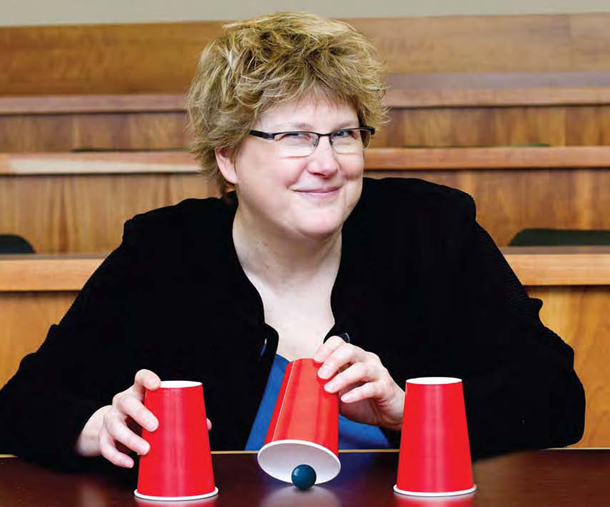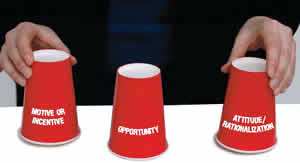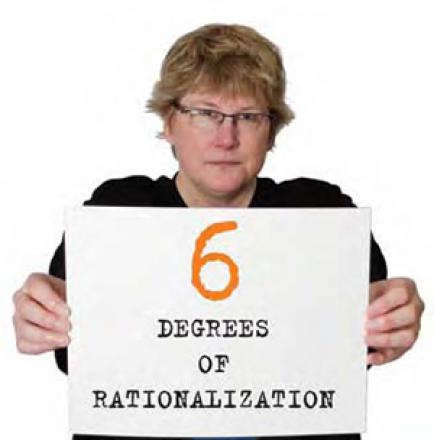Rationalizing Fraud

Who knows at what point an act of fraud begins? What influences those fateful decisions made when opportunities appear? Pamela Murphy wants to know. On this day, the Queen’s School of Business accounting professor is on the telephone with a fraudster, who explains how he ended up in a West Virginia prison.
He was hired into a high-level management position with an organizational culture different from his previous experience. Getting things done efficiently and at any cost was of utmost concern. His colleagues often took short cuts, even when they didn’t pass the smell test. So he began doing the same. Before he knew it, short cuts turned into fraud, and he found himself in prison.
“Did you know that what you were doing was wrong?” Pamela asks.
“Maybe in the back of my mind, but everyone was doing it,” he replies with resignation. “You know, fraud can hit you in the head like a feather.”
Such stories fascinate Pamela. “They show that individuals can perpetrate fraud without necessarily realizing it,” she says. “At times, it’s difficult to distinguish between fraudulent and non-fraudulent activity. That’s not the way fraud starts with everyone, but the scary thing is, that’s the way fraud can start.”
Often, the tipping point is how we rationalize our behaviour. We can explain away just about anything to ourselves. Understanding how people rationalize unethical or fraudulent behaviour is where Pamela is making her mark. And if she has her way, her research will one day help protect us from ourselves and the mind games we play.
Rationalization... enables people to maintain their code of ethics and avoid guilt or self-condemnation.
Fraud carries a huge financial cost to the economy. According to a recent report by PricewaterhouseCoopers, one in three organizations is a victim of fraud within a one-year period. Another study by the Association of Certified Fraud Examiners indicates that organizations lose about five percent of annual revenues to fraud.
Pamela’s research focuses on the so-called “fraud triangle,” a concept based on the work of American criminologist Donald R. Cressey that describes the three factors that drive acts of fraud: motive or incentive, opportunity, and attitude/rationalization. Of the three, rationalization is the wild card, the one factor that relies on the mysterious mindset of the individual. “Rationalization is perhaps the most insidious,” says Pamela, “because it enables people to maintain their code of ethics and avoid guilt or self-condemnation.”
She saw numerous rationalizations during her 20 years in the business world, where she worked as an auditor, controller, marketing manager and management consultant in Minneapolis, Chicago and the U.S. upper Midwest. Reviewing internal marketing reports, for example, she noticed huge bumps in sales figures towards year end, a tip-off that fat bonuses were being paid out. “It didn’t really make sense, and yet no one was questioning it,” she recalls.
“Everyone else does it” and “no one gets hurt” are popular rationalizations.
 undefined Though she did well in the corporate world, something was missing. “I couldn’t satisfy my curiosity,” she says. So she returned to school in 2002 to earn a PhD in accounting from the University of Wisconsin-Madison, previously having completed a Master of Management in Marketing from J.L. Kellogg Graduate School of Management at Chicago’s Northwestern University. In 2007, she accepted a post as an Assistant Professor of Accounting at Queen’s.
undefined Though she did well in the corporate world, something was missing. “I couldn’t satisfy my curiosity,” she says. So she returned to school in 2002 to earn a PhD in accounting from the University of Wisconsin-Madison, previously having completed a Master of Management in Marketing from J.L. Kellogg Graduate School of Management at Chicago’s Northwestern University. In 2007, she accepted a post as an Assistant Professor of Accounting at Queen’s.
Now, as an academic, her curiosity has been unleashed and is currently focused on research into the psychology of fraud, virgin territory for accounting scholars and the profession alike. “How do you study what’s going on in someone’s head?” she asks. “The audit standard says little about attitude and rationalization; it’s not observable, so what can we do? This kind of perception goes on virtually all the time in organizations, and people are afraid to talk about fraud in detail because it will bring a bad light to how business is done.”
To learn how people rationalize unethical behaviour, Pamela runs experiments with students in networked computer labs. She plays with the three sides of the fraud triangle—incentive, opportunity, and rationalization—to see how people rationalize behaviour when they have opportunity and motive to act unethically. Students perform a task that leads to earned income, then are given the opportunity to report their hours worked—even lie—in order to be paid more. In this way she can identify how people rationalize unethical behaviour, using excuses such as “everyone else does it” or “no one gets hurt.” In other experiments, she has removed some of these rationalizations to determine if that would induce people to act ethically.
Surveys and interviews supplement the lab research. In 2010, working with QSB Associate Professor of Accounting Clinton Free, Pamela interviewed more than 40 current and former inmates convicted of fraud and also surveyed witnesses and investigators of fraud. They are now analyzing the results and Pamela is excited about how this research is adding nuance to her understanding of rationalization.
She is also intrigued by research in neuroscience showing that the part of the brain that processes negative emotions also plays a large role in ethical decision making. When someone contemplates acting unethically, this same part of the brain lights up. “It’s saying, ‘Hey, we’re sending a signal here; you shouldn’t be doing this,’” says Pamela. “Rationalization is what allows us to calm down that negative emotion.”
Her experiments show how people rationalize behaviour when they have opportunity and motive to act unethically.
Her research has been published in scholarly journals such as Contemporary Accounting Research and Journal of Business Ethics. The mainstream press is also taking note. A Financial Post story on December 27, 2010, ran under the headline, ‘Professor claims most people capable of fraud.’ “When a fraud is made public, many people call the fraudsters bad apples or evil, and that’s not necessarily true,” Pamela told the reporter. “I am not trying to defend fraudsters, but what I’ve learned from my own research and reading others’ is that we are virtually all capable of committing fraud.”
She hopes that her research will eventually sensitize people to the ways in which they rationalize their actions, saving them from following the pathway to fraud. “I like to think that if we can all be more aware of rationalizations, we may be able to catch ourselves before it goes too far.” She’s already become more self-aware. “I find myself rationalizing,” she says. “If I speed on Highway 401, I tell myself that everyone does it, that I’m not hurting anyone. But that doesn’t excuse me from speeding.”
Pamela also holds out hope that more awareness of the “fraud triangle” will help organizations and auditors—and, ultimately, the general public—detect fraud. Perhaps auditors, using enhanced interview skills, can learn to detect the rationalizations that are psychological red flags for underhanded behaviour.
“We don’t know as much about fraud as we need to,” says Prof. Murphy. “If we did, I think there’d be less of it going on in the world.”

